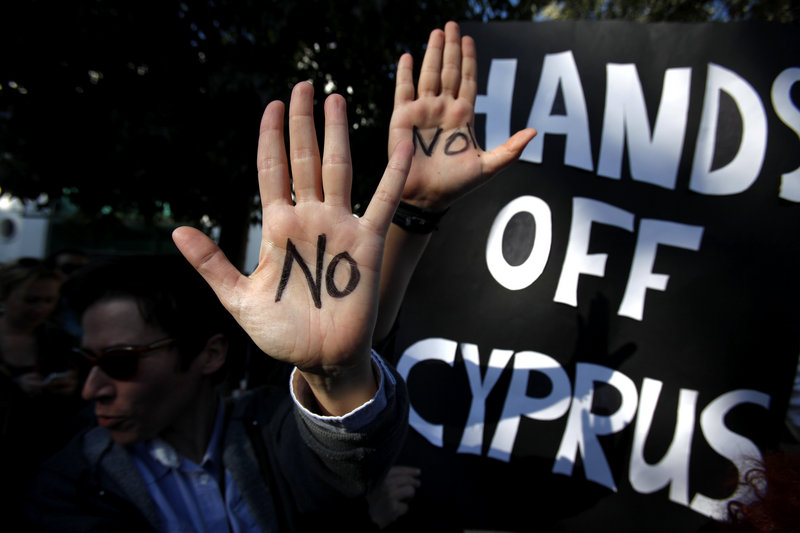NICOSIA, Cyprus — A plan to seize up to 10 percent of savings accounts in Cyprus to help pay for a $20.4 billion financial bailout was met with fury Monday, and the government shut down banks until later this week while lawmakers wrangled over how to keep the island nation from bankruptcy.
Though the euro and stock prices of European banks fell, global financial markets largely remained calm, and there was little sense that bank account holders elsewhere across the continent faced similar risk.
Political leaders in Cyprus scrambled to devise a new plan that would not be so burdensome for people with less than $129,290 in the bank.
The authorities delayed a parliamentary vote on the seizure of $7.5 billion and ordered banks to remain shut until Thursday while they try to modify the deal, which must be approved by other eurozone governments. Once a deal is in place, they will be ready to lend Cyprus $13 billion in rescue loans.
A rejection of the package could see the country go bankrupt and possibly drop out of the euro currency – an outcome that would be even more damaging to financial markets’ confidence.
Even while playing down the chance of fresh market turmoil, experts warned that the surprise move broke an important taboo against making depositors pay for Europe’s bailouts. As a result, it may have longer-term consequences for confidence in Europe’s banking system and its ability to end its financial crisis.
“It’s a precedent for all European countries. Their money in every bank is not safe,” said lawyer Simos Angelides at an angry protest outside parliament in Cyprus’ capital, Nicosia, where people chanted, “Thieves, thieves!”
Eurozone finance ministers held a telephone conference Monday night, and concluded that small depositors should not be hit as hard as others. They said the Cypriot authorities will stagger the deposit seizures more, but they remained firm in demanding that the overall sum of money raised by the seizures remain the same.
In the short term, there was little sign of a new explosion in the European financial crisis. Stock markets dropped in early hours but stabilized by the close. The Dow Jones industrial average fell 62.05 points, or 0.4 percent, to 14,452.06 Monday. The euro fell 0.6 percent – a bad day, but hardly a token of impending doom. Government bond prices for Italy and Spain were roughly unchanged, suggesting that investors do not expect the market trouble to spread beyond Cyprus for now.
In part, that may be due to the fact that Cyprus’ case is by many measures an exception.
The decision to hit deposits up to $129,290 – the deposit insurance limit in Cyprus – with a 6.75 percent tax and those above that with a 9.9 percent tax was dictated partly by the unusual qualities of the country’s financial system.
Cyprus, with only 0.2 percent of the eurozone economy, has a bloated banking system seven times the size of the island’s economy. Losses on Greek government bonds had crippled Cypriot banks and required government money to bail them out. Meanwhile, a large proportion of deposits – 37 percent – come from people outside Cyprus and the European Union, much of it from Russia.
European leaders wanted to limit the size of the rescue loans – which are backed by European taxpayers – to $13 billion. Leaders were also reluctant to bail out Russian depositors whose funds may be the result of tax evasion, crime or money laundering.
Dario Perkins, an analyst at Lombard Street Research, noted that “the German government couldn’t be seen bailing out Russian mafiosi just before an election.”
He said the bailout also showed that European leaders were willing to decisively confront Cyprus’ problem – rather than postponing the day of reckoning with a partial solution. “On one level, you could argue this deal is good news,” he wrote to investors.
Officials say by tapping the depositors, they are reducing the total amount of debt taken on by the government, keeping it to a high but manageable 100 percent of GDP by 2020. That will mean less-painful austerity cutbacks than those that were imposed on Greece as a condition of its loans. Partly as a result, Greece is in the sixth year of recession.
Markets have been more resistant to new shocks since the European Central Bank’s offer to purchase the bonds of indebted countries, lowering their borrowing costs. No bonds have been bought, but the offer’s existence has calmed markets and left the eurozone far more resilient than it was a year ago.
Copy the Story LinkSend questions/comments to the editors.



Success. Please wait for the page to reload. If the page does not reload within 5 seconds, please refresh the page.
Enter your email and password to access comments.
Hi, to comment on stories you must . This profile is in addition to your subscription and website login.
Already have a commenting profile? .
Invalid username/password.
Please check your email to confirm and complete your registration.
Only subscribers are eligible to post comments. Please subscribe or login first for digital access. Here’s why.
Use the form below to reset your password. When you've submitted your account email, we will send an email with a reset code.